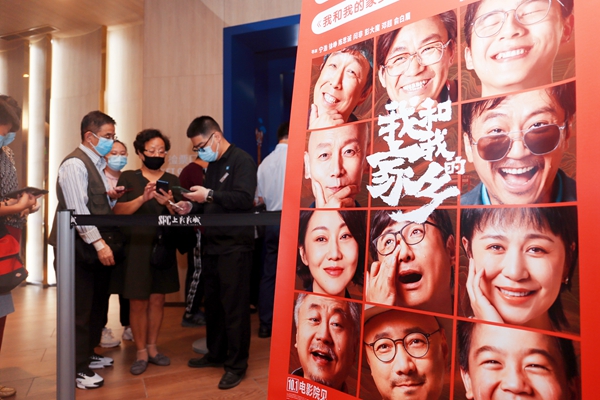Cinema's leading role


Breakthrough
An enduring genre perhaps distinctive to Chinese cinema, zhuxuanlyu (mainstream theme)-referring to films revisiting revolutionary chapters of the Communist Party of China or eulogizing role models and patriotic heroes-is one of the categories that has enjoyed the biggest improvement in terms of innovation in recent years, say experts and insiders.
The term was first raised during a meeting of China's top movie regulators in 1987, ushering in a decadeslong period of creating such films. Getting the incredible story out to the public in cinematic form was initially a challenge.
But with blockbusters tailored for significant anniversary celebrations, such as the marking of reform and opening-up, the founding of People's Republic of China, and the founding of the CPC, the genre has found a way to reach a wider viewership, says Yin Li, vice-chairman of the China Film Directors' Guild.
"Nowadays, insiders and researchers are more willing to call such films 'new mainstream blockbusters', as those tales not only convey the mainstream values of our society, but also achieve remarkable success in the market," adds Yin, an award-winning director.
Widely regarded as a watershed blockbuster to redefine such films, the movie The Founding of a Republic-which was produced to mark the 60th anniversary of New China's founding-gathers a cast unprecedented in star power, packed with more than 170 big names, including Jackie Chan and Jet Li in cameo roles. The movie grossed 450 million yuan, topping the country's box office in 2009.
Following the success, The Founding of a Party, a second installment of The Founding trilogy to mark the 90th anniversary of the founding of the CPC, again employed a similar formula. Gathering together more than 100 stars to retell the Party's early history, it also earned critical acclaim and commercial success, becoming the second highest-grossing Chinese film in 2011.
After Tsui Hark's The Taking of the Tiger Mountain became a hit in 2014, mainland studios realized that Hong Kong talent could help China's zhuxuanlyu films adopt a more appealing perspective. Their profound knowledge and skill in dealing plot twists and action were honed in Hong Kong's fast-paced and prolific film industry.
A greater number of directors from Hong Kong have since joined projects retelling the tales of Chinese heroes, exemplified by Andrew Lau's The Founding of an Army (2017), as well as Dante Lam's Chinese Navy-themed Operation Red Sea (2018) and The Rescue (2020).
Exemplifying the public's rising appetite for such films, Tsui and Lam have also joined hands with renowned director Chen Kaige to shoot the patriotic film, The Battle at Lake Changjin. This focuses on the Chinese People's Volunteers who went to the Korean Peninsula to fight in the War to Resist US Aggression and Aid Korea (1950-53). It is set to be released this year.
Lau has also been recruited to direct Chinese Doctors, a movie about medical staff battling against the pandemic in Wuhan, the capital city of Hubei province, the Chinese city hardest hit by the COVID-19 outbreak earlier last year.
Approaching the 100th anniversary of the founding of the CPC, which will fall on July 1, a clutch of revolutionary films will be shown, with the celebrity-studded 1921 being one of the most anticipated.
Another format that has proved successful for filmmakers in the Chinese mainland is the one employed in My People, My Country (2019) and My People, My Homeland (2020). These two blockbuster anthology films, comprising several stand-alone stories based around a single theme, have set a successful example for domestic filmmakers about assembling top talent and resources to tell zhuxuanlyu stories through the perspective of ordinary people.
"This year has set a trend that sees more renowned filmmakers and A-list stars moving to shoot such films," says Zhao Ningyu, a professor with the Beijing Film Academy.
"We believe that using ordinary people as protagonists, from college students to soldiers and farmers, could become a new way of doing things in the future," adds Zhao.
Wang Changtian, president of the Beijing-based studio Enlight Media, predicts that, over the next five years, the film industry will shoot around 50 zhuxuanlyu films with a total budget up to 20 billion yuan. He made the prediction during a forum at the recently concluded 24th Shanghai International Film Festival.
A total of around 200 such films have been screened since 2007, drawing a box-office revenue of more than 52.5 billion yuan, according to the National Business Daily.





































